Overview
Healthcare providers often face emotional challenges, particularly when it comes to ensuring patient privacy and operational efficiency. The benefits of HIPAA compliant transcription can be a beacon of hope in this landscape. By safeguarding sensitive information, it alleviates the stress associated with administrative burdens, allowing providers to focus on what truly matters: patient care.
Imagine a scenario where the administrative tasks are streamlined through automation. This not only reduces the workload but also fosters trust between patients and providers. Enhanced communication leads to improved patient care and satisfaction, creating a nurturing environment for all involved.
Ultimately, embracing HIPAA compliant transcription is not just about compliance; it’s about optimizing the overall healthcare experience. By prioritizing patient privacy and operational efficiency, healthcare providers can significantly enhance their practice. Are you ready to explore how these solutions can transform your approach to patient care?
Introduction
In the intricate landscape of healthcare, providers often find themselves facing the emotional strain of delivering exceptional patient care while navigating overwhelming administrative tasks. This dual challenge can feel daunting, leaving little room for the compassionate attention that patients deserve. As a nurturing response, the implementation of HIPAA compliant transcription services stands out as a powerful solution. These services not only enhance patient privacy but also offer significant operational efficiencies that can alleviate some of the burdens faced by healthcare professionals.
However, as the demand for accurate and secure documentation continues to grow, healthcare providers may wonder: how can they effectively leverage these services to foster trust and improve patient outcomes? By embracing these transcription solutions, providers can create a more supportive environment for both themselves and their patients, ultimately leading to better care experiences.
Consider this: what if you could streamline your documentation processes while ensuring the utmost confidentiality for your patients? Imagine the peace of mind that comes from knowing your administrative tasks are handled efficiently, allowing you to focus more on what truly matters—your patients. It’s time to explore how these services can transform your practice and enhance the care you provide.
Reflecting on your own experience, have you felt the weight of administrative burdens? You’re not alone. Many healthcare professionals share this struggle, and it’s essential to recognize that there are solutions available. By integrating HIPAA compliant transcription services into your workflow, you can not only ease your workload but also reinforce the trust that is vital to patient relationships.
CosmaNeura: Streamline HIPAA Compliant Transcription for Enhanced Patient Privacy
Healthcare providers often face emotional challenges due to overwhelming administrative tasks. CosmaNeura understands this struggle and utilizes to ensure that all documentation processes include . This commitment not only protects sensitive client information but also involves HIPAA compliant transcription, fostering greater trust between healthcare providers and those receiving care.
By automating documentation tasks, CosmaNeura significantly reduces the likelihood of human error. This means that client data remains confidential and secure throughout the recording process. Did you know that manual transcription errors occur at a rate of about 3.7%? This statistic highlights the critical role of AI solutions in improving accuracy and addressing physician concerns about the quality of care.
Moreover, AI-driven scribes save most doctors an average of one hour each day. Imagine what you could achieve with that extra time! Medical providers can optimize their workflows, concentrate more on patient care, and reduce burnout. This efficiency is especially vital in , where maintaining face-to-face interactions is paramount.
Embrace the potential of AI technology to transform your practice. It’s time to focus on what truly matters—providing exceptional care to your patients.
Accurate Documentation: Ensure Compliance and Improve Patient Care Quality
Ensuring that every interaction with clients is documented accurately is vital for HIPAA compliant transcription. This precision is not just a regulatory requirement; it’s essential for maintaining in HIPAA compliant transcription. Have you ever considered how precise documentation can lead to better clinical decision-making? It significantly reduces the chances of errors, ensuring that healthcare professionals have reliable access to individual histories.
Moreover, research indicates that:
- 88% of practitioners believe their Electronic Health Records (EHRs) provide clinical advantages.
- 94% find these records easily accessible at the point of care.
This accessibility is crucial, especially when time is of the essence. The use of health portals further enhances engagement and communication, leading to improved health outcomes for patients.
By prioritizing precise documentation, medical providers can create a safer and more efficient care environment. This not only benefits the individuals they serve but also alleviates some of the administrative burdens that can weigh heavily on healthcare providers. Let’s work together to cultivate a care setting that truly supports both patients and practitioners.
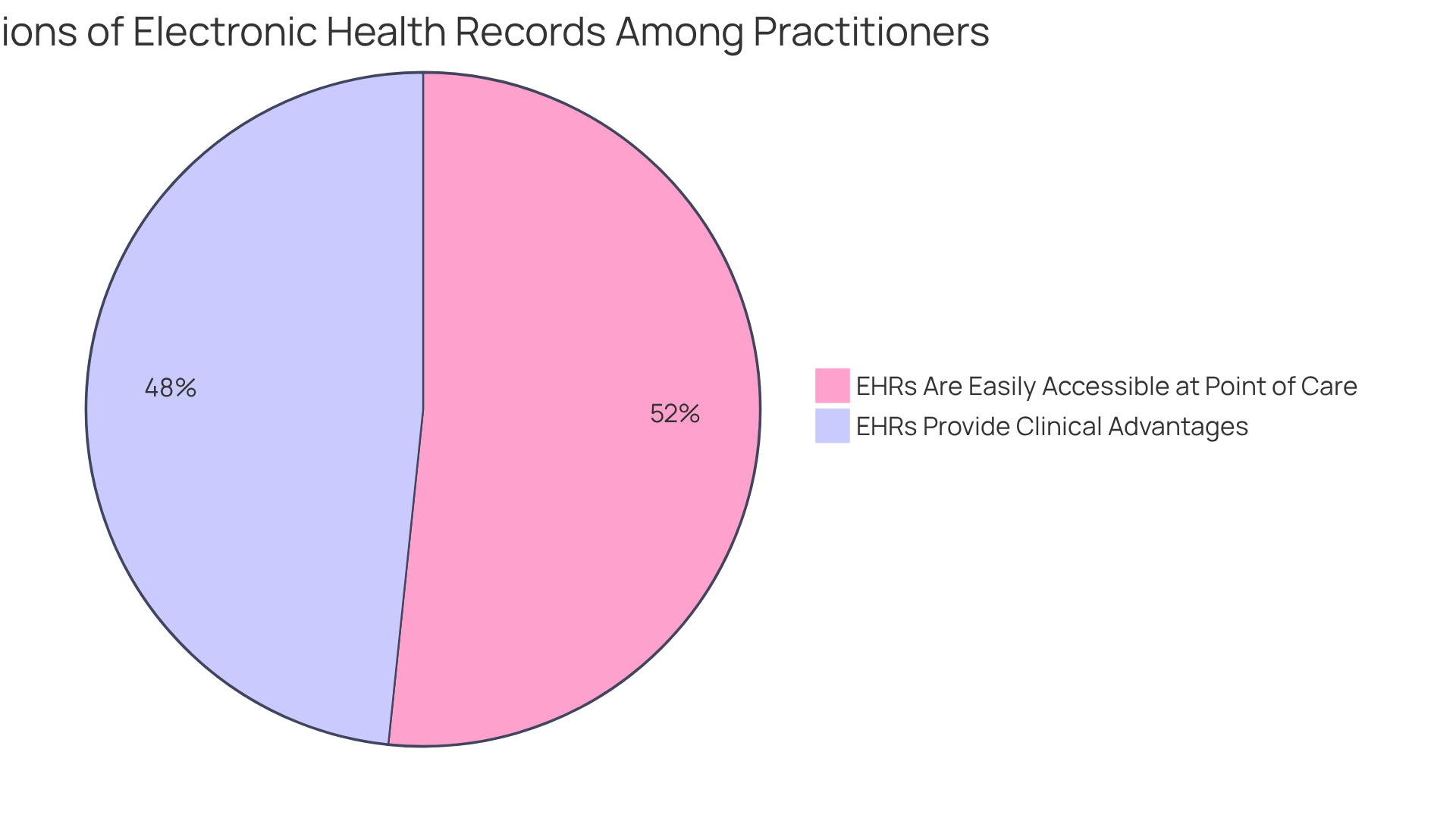
Risk Mitigation: Reduce Data Breach Risks with Compliant Transcription Services
Implementing HIPAA compliant transcription services is essential for safeguarding sensitive patient information and reducing the emotional burdens experienced by healthcare providers. These services utilize stringent security measures, including advanced encryption protocols and strict access controls, ensuring that only authorized individuals can access sensitive data. By doing so, providers can significantly reduce the risk of unauthorized disclosures and utilize HIPAA compliant transcription to maintain compliance with HIPAA regulations.
With 725 exposing over 133 million records, and 79.7% of these breaches attributed to hacking incidents, the need for robust security measures is clear. It’s concerning to note that 32% of all recorded data breaches from 2015 to 2022 occurred in the healthcare sector. This reality underscores the importance of focusing on HIPAA compliant transcription within this field. Healthcare institutions that prioritize documentation compliance not only safeguard individual data but also enhance their overall security posture, fostering trust and dependability in their operations.
As cybersecurity expert Steve Alder reminds us, "A HIPAA Notice of Privacy Practices advises patients and plan members of their privacy rights, how the organization can use or disclose PHI." To further mitigate risks, medical professionals are encouraged to regularly assess their documentation services for HIPAA compliant transcription. This proactive approach ensures they are well-prepared to manage sensitive information responsibly, ultimately benefiting both their practice and their patients.
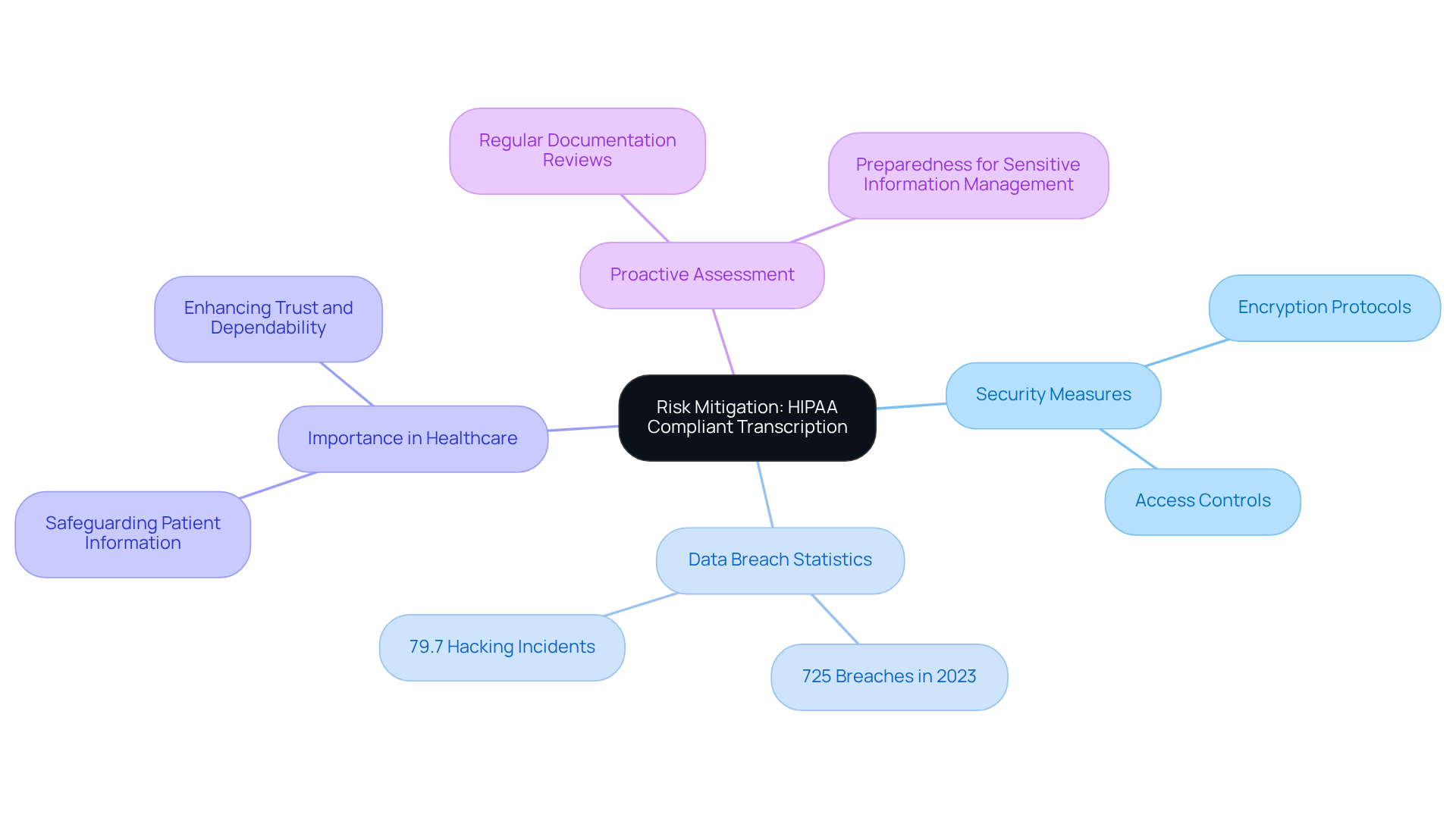
Operational Efficiency: Free Up Time for Patient Care with Compliant Transcription
Healthcare providers often face overwhelming administrative burdens that can detract from their primary mission: patient care. By automating documentation tasks, medical professionals can reclaim invaluable time that would otherwise be spent on record-keeping. CosmaNeura's HIPAA compliant transcription services simplify the documentation process, allowing clinicians to focus more on meaningful interactions with their clients and less on administrative duties.
This operational efficiency not only enhances productivity but also significantly boosts job satisfaction among healthcare providers. As a result, the quality of care for patients improves. Imagine being among the more than 12,000 healthcare providers who are reportedly saving an average of two hours each day through efficient documentation solutions. This extra time can be dedicated to what truly matters—caring for patients.
Dr. Michael Schlosser captures this sentiment perfectly, stating, "There’s a holy grail that doctors always talk about, which is that I could just go provide care, and the documentation would take care of itself." By integrating AI-driven recording tools that are adaptable across various specialties, CosmaNeura alleviates the administrative burden and helps mitigate the risk of burnout. This is particularly crucial given that 63% of physicians reported experiencing at least one symptom of burnout in 2021.
Ultimately, by allowing clinicians to engage more deeply with those they serve, CosmaNeura's solutions not only but also nurture the well-being of healthcare providers. Isn't it time to explore how these innovative solutions can transform your practice and improve your connection with patients?
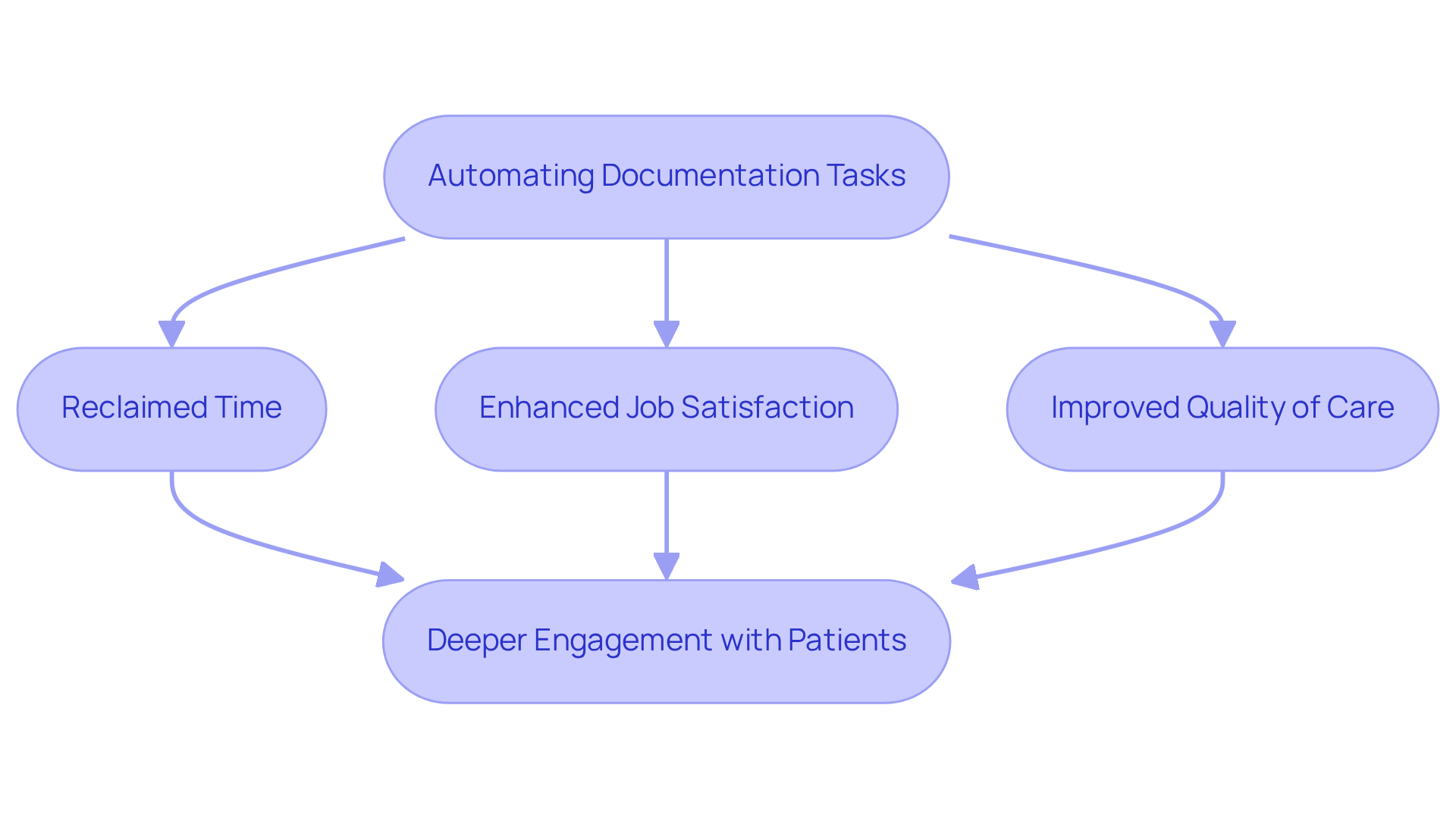
Improved Communication: Foster Team Collaboration with Compliant Transcription
Healthcare providers often face emotional challenges that can hinder their ability to deliver the best care. HIPAA compliant transcription services can significantly alleviate these burdens by delivering accurate and timely documentation of interactions with individuals. This accuracy not only promotes improved collaboration among medical teams but also ensures that everyone is aligned on care strategies.
Insights from over 40 customer interviews conducted by CosmaNeura reveal that medical professionals encounter considerable administrative challenges, such as time-consuming documentation processes and the risk of mistakes. Imagine how much smoother treatment planning could be with accurate documentation—minimizing misunderstandings and leading to more coordinated efforts in delivering care. As one medical professional wisely stated, 'When our records are accurate, it enables us to concentrate on what genuinely counts—those we care for.'
This improved communication ultimately enhances the overall patient experience. Teams can respond more effectively to patient needs and collaborate seamlessly on treatment plans. Moreover, studies show that efficient communication can enhance productivity by as much as 25%, underscoring the vital importance of accuracy in fostering collaboration within medical teams.
Consider the financial implications as well: miscommunication costs US businesses $12,506 per employee each year. This highlights the urgency of addressing communication issues. Efficient team communication also boosts employee retention by 4.5 times compared to environments lacking an effective communication strategy, connecting back to job satisfaction and retention in the medical field.
To leverage these benefits, medical practitioners should consider adopting , such as those provided by CosmaNeura. These services align with our mission to reduce administrative burdens and improve care, allowing healthcare providers to focus on what truly matters—their patients.
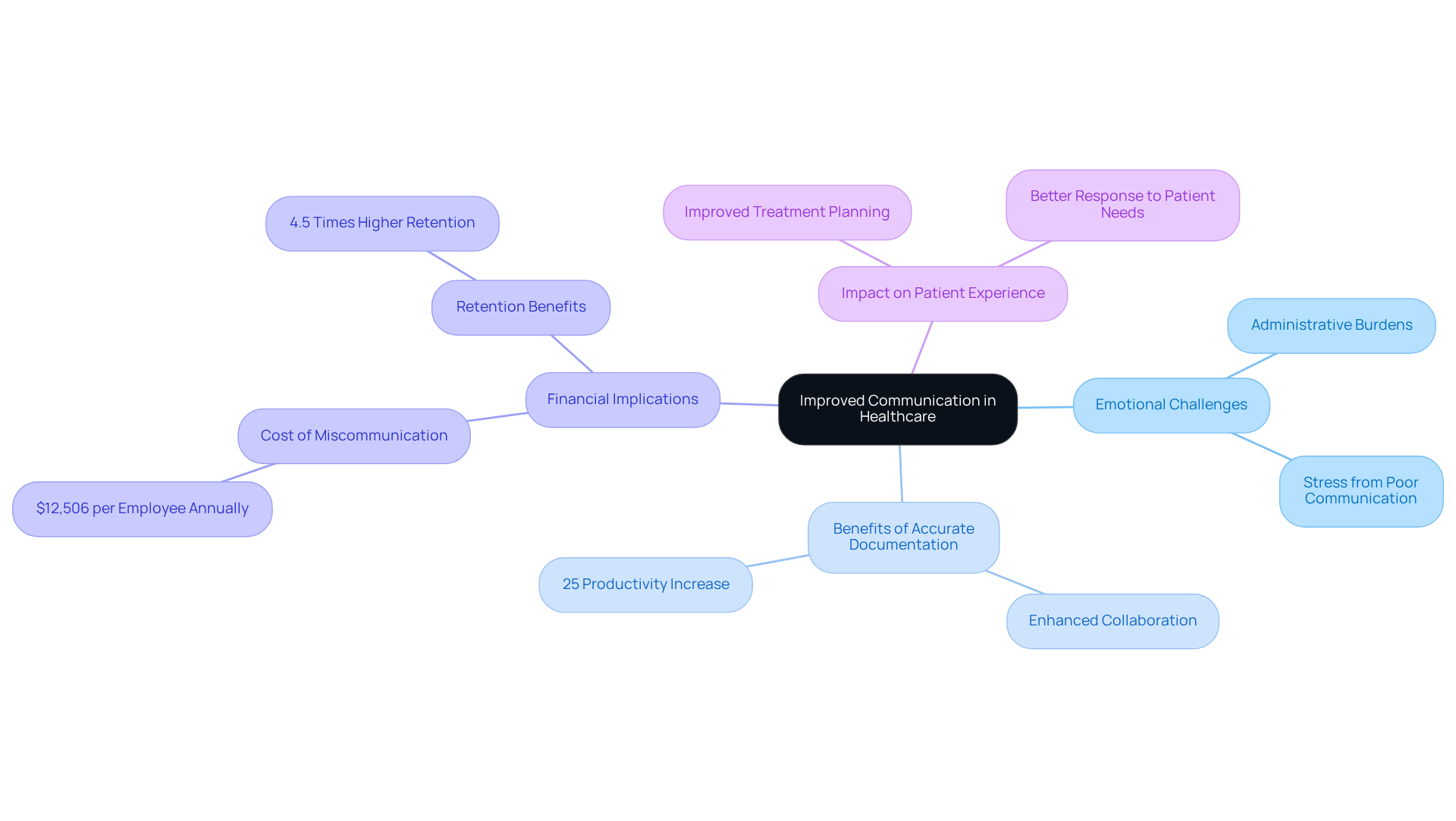
Patient Trust: Build Stronger Relationships through HIPAA Compliance
Following HIPAA regulations is not just a legal obligation; it is a vital step in protecting individual data and nurturing trust between healthcare professionals and those they serve. When patients feel assured that their is handled with the utmost care and confidentiality, they are more likely to communicate openly with their providers. This trust is crucial for meaningful conversations, leading to improved health outcomes, as individuals feel empowered to share their concerns and medical histories.
Have you ever considered how confidentiality impacts patient honesty? Studies show that medical professionals who prioritize confidentiality are more likely to receive accurate symptom reports. This transparency enables better-informed decisions and personalized treatment plans, ultimately enhancing patient care.
As the medical landscape evolves, maintaining patient trust through strong data protection practices is essential. It fosters robust patient-provider relationships, allowing for deeper connections and better health outcomes. Together, let’s commit to upholding these standards, ensuring that our patients feel safe and valued in their healthcare journeys.
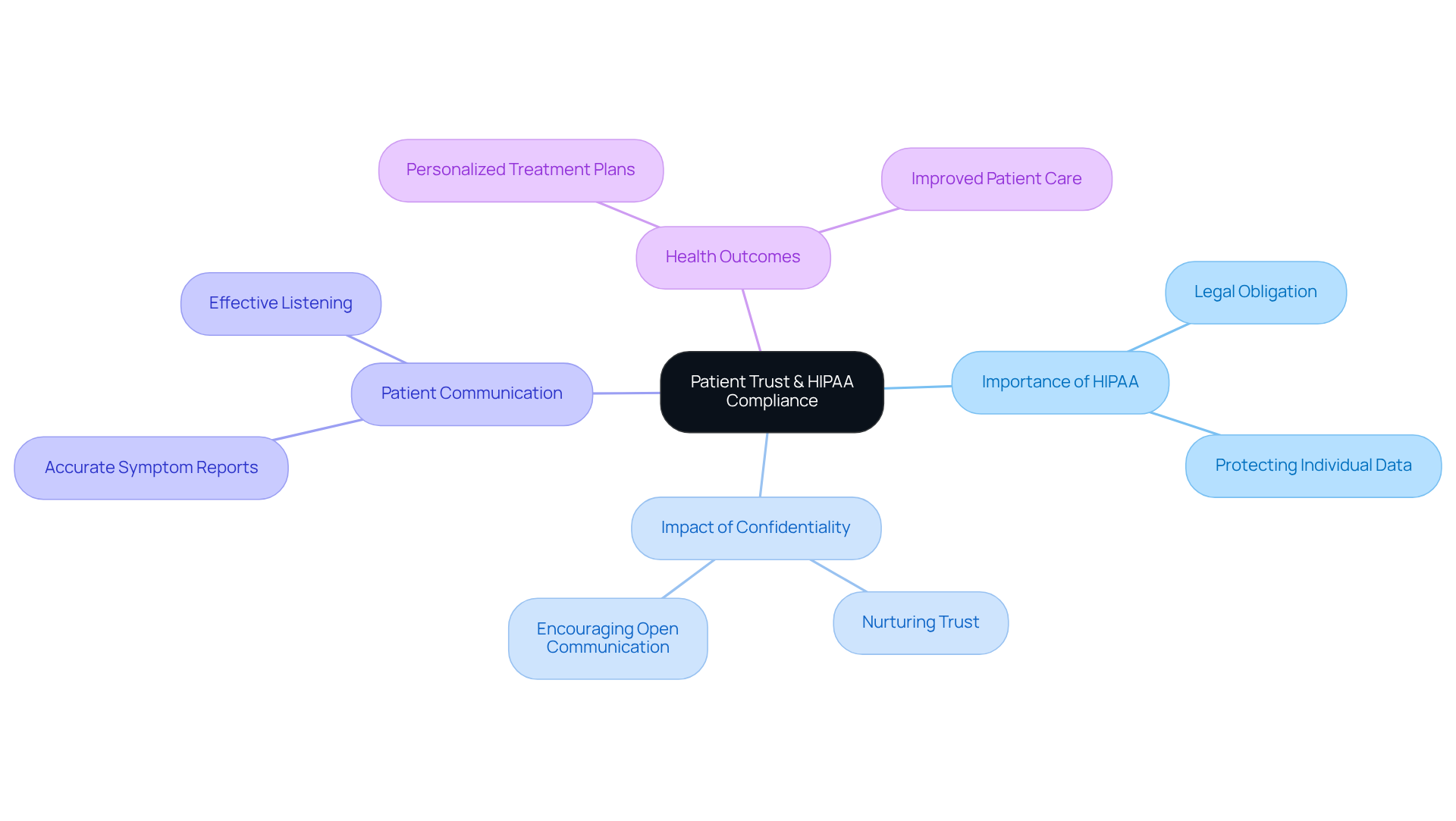
Financial Growth: Maximize Revenue with HIPAA Compliant Transcription
Healthcare providers often face overwhelming emotional challenges due to administrative burdens that can detract from patient care. Implementing HIPAA compliant transcription services, especially via CosmaNeura's innovative Agentic Platform, provides a compassionate solution to these challenges. By ensuring accurate documentation and optimizing billing processes, providers can not only alleviate stress but also maximize their revenue potential.
Imagine a world where generative AI enhances efficiency and reduces administrative burdens. This transformative technology minimizes the likelihood of billing errors and streamlines claims processing, allowing healthcare practitioners to focus more on their patients. As a result, practices can experience improved financial performance while fostering a patient-centered approach to care.
Now is the time to consider how these solutions can support your practice. Embrace the opportunity to enhance your operations and, in turn, elevate the quality of care you provide. With the right tools, you can with confidence and compassion.
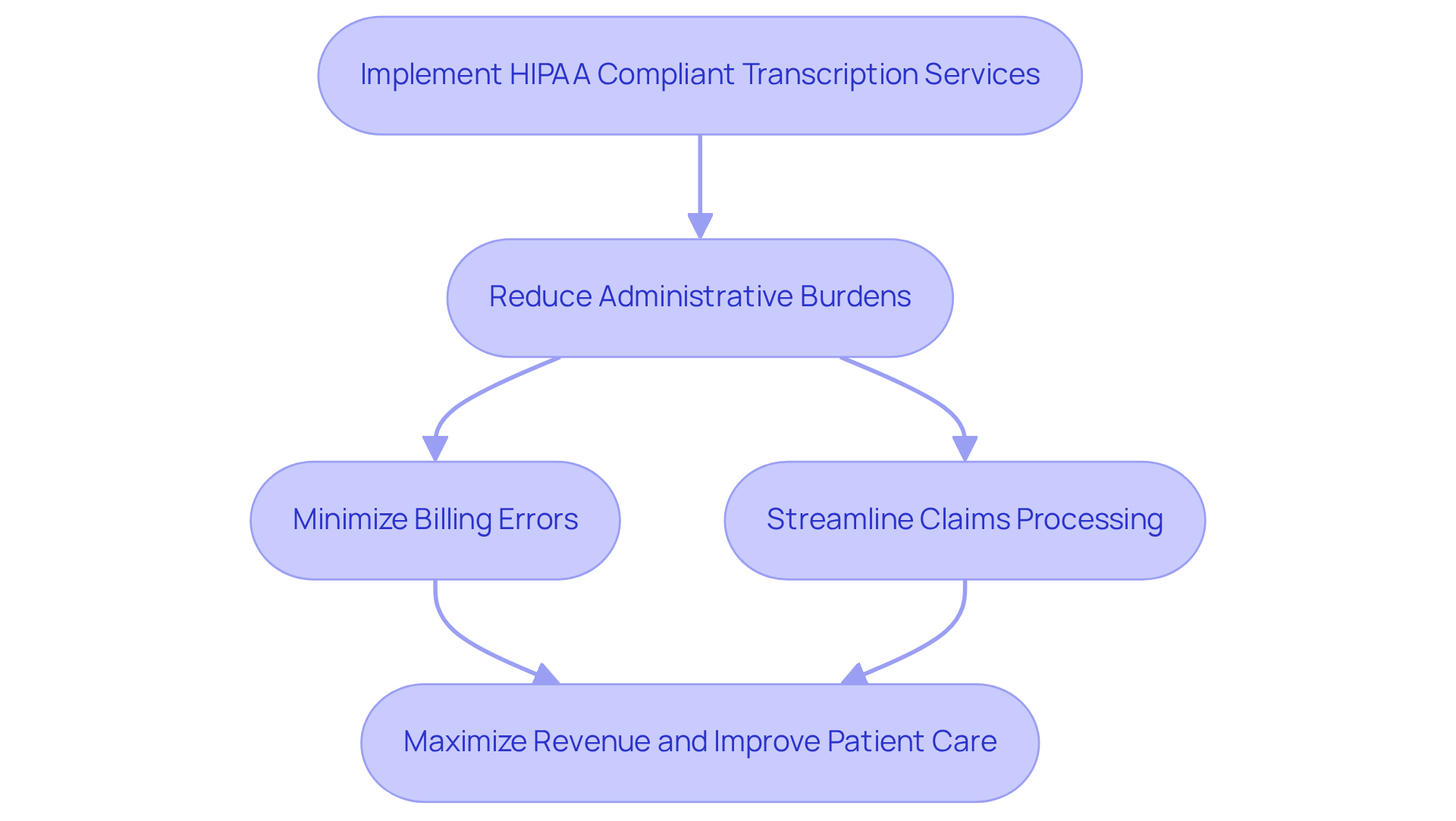
Continuous Training: Enhance Compliance and Accuracy in Transcription Services
Upholding is not just a regulatory requirement; it’s a vital part of protecting patient information. For healthcare providers, the emotional challenge of ensuring compliance while delivering quality care can feel overwhelming. Regular training for typists is crucial in this journey. By participating in ongoing training sessions, transcriptionists can stay updated on the latest regulations, medical terminology, and best practices necessary for HIPAA compliant transcription. This commitment to continuous learning not only enhances the quality of records but also reinforces the importance of safeguarding client information.
Organizations must conduct annual risk analyses to achieve HIPAA compliant transcription, underscoring the need for continuous training and compliance efforts. As Marc Haskelson, President and CEO of Compliancy Group, wisely states, "It is more important than ever for medical organizations to be aware of the threat to their security." This highlights the urgency of fostering a culture of learning within healthcare settings. By doing so, providers can significantly improve their documentation accuracy and compliance, ultimately protecting patient information and enhancing overall care quality.
Imagine the peace of mind that comes from knowing your team is well-equipped to handle the complexities of HIPAA regulations. By promoting a culture of learning, healthcare providers can not only navigate administrative burdens more effectively but also focus on what truly matters: delivering exceptional patient care. Let’s embrace this opportunity for growth together, ensuring that we prioritize both compliance and compassion in our practices.
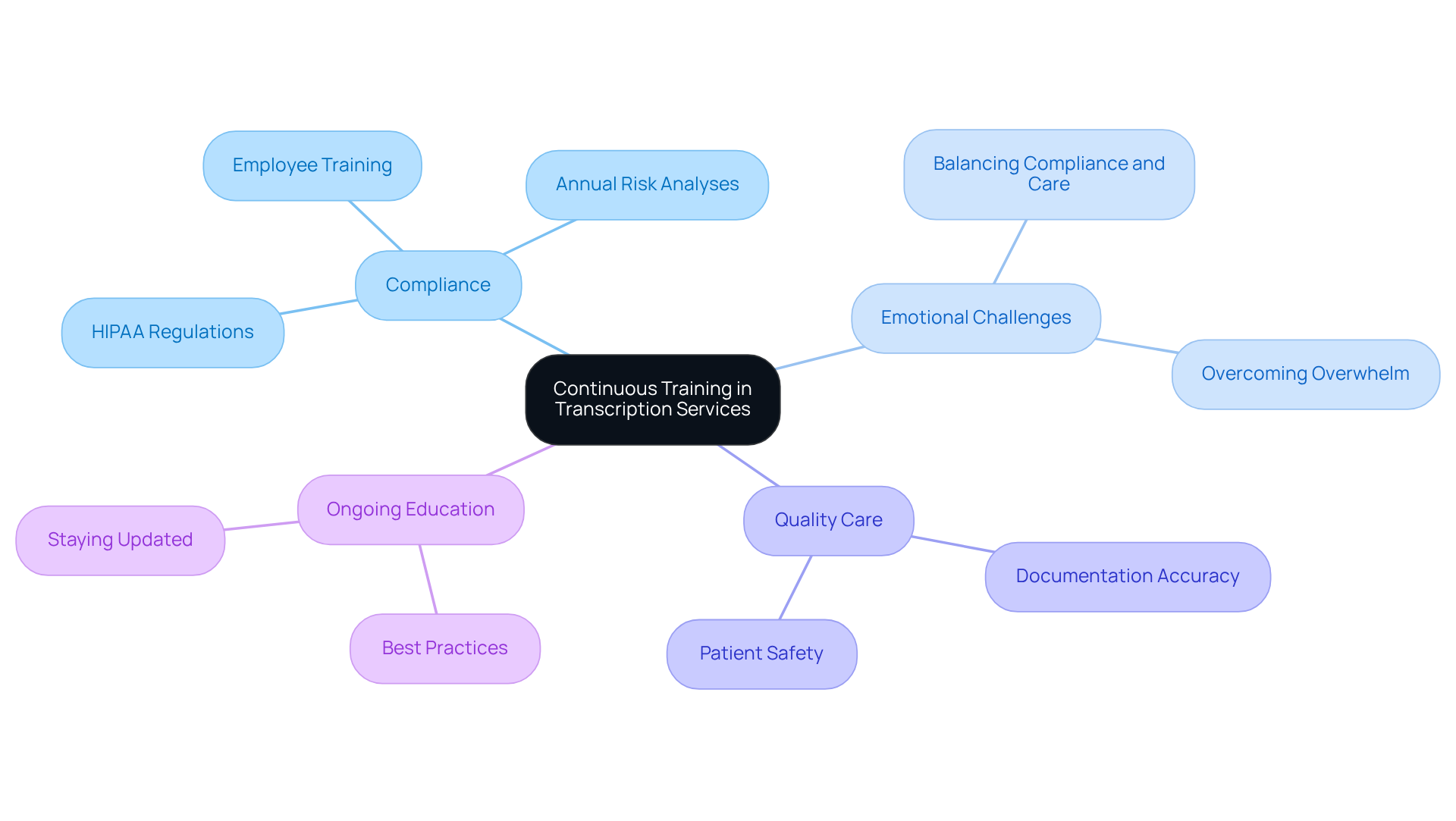
Technological Advancements: Leverage AI for HIPAA Compliant Transcription
AI technology is revolutionizing the way healthcare providers utilize HIPAA compliant transcription services, offering a compassionate solution to the challenges they face. By automating processes, it significantly enhances turnaround times and precision, allowing practitioners to focus more on the care of their patients. Advanced algorithms excel at recognizing medical terminology and context, ensuring that HIPAA compliant transcription is not only accurate but also compliant. This progress alleviates administrative burdens that often contribute to physician burnout, enabling professionals to concentrate on meaningful interactions that ultimately enhance the quality of care delivered.
Imagine a world where documentation errors are reduced, leading to improved patient safety and satisfaction. With AI, are poised to experience this transformation. As the medical field evolves, utilizing AI for documentation becomes essential for maintaining high standards of care and operational efficiency. According to industry projections, the medical AI market size is expected to grow from $20.9 billion in 2024 to $148.4 billion by 2029, underscoring our increasing reliance on AI technologies.
Moreover, as highlighted by a Healthcare Development Specialist, 'AI-driven EHR automation can manage routine data entry, recordings, and even intelligent data organization.' This statement underscores the transformative potential of AI in medical record-keeping. To stay ahead in this rapidly changing landscape, medical providers should consider exploring AI documentation solutions. By doing so, they can enhance their record-keeping practices and ultimately improve the overall care they provide to their clients.
Key Benefits of AI in Documentation:
- Increased efficiency: Streamlined processes reduce time spent on paperwork.
- Enhanced accuracy: Advanced algorithms minimize errors in documentation.
- Improved patient care: More time for meaningful interactions with patients.
As we navigate these changes together, let us embrace the potential of AI to support our mission of delivering exceptional care.
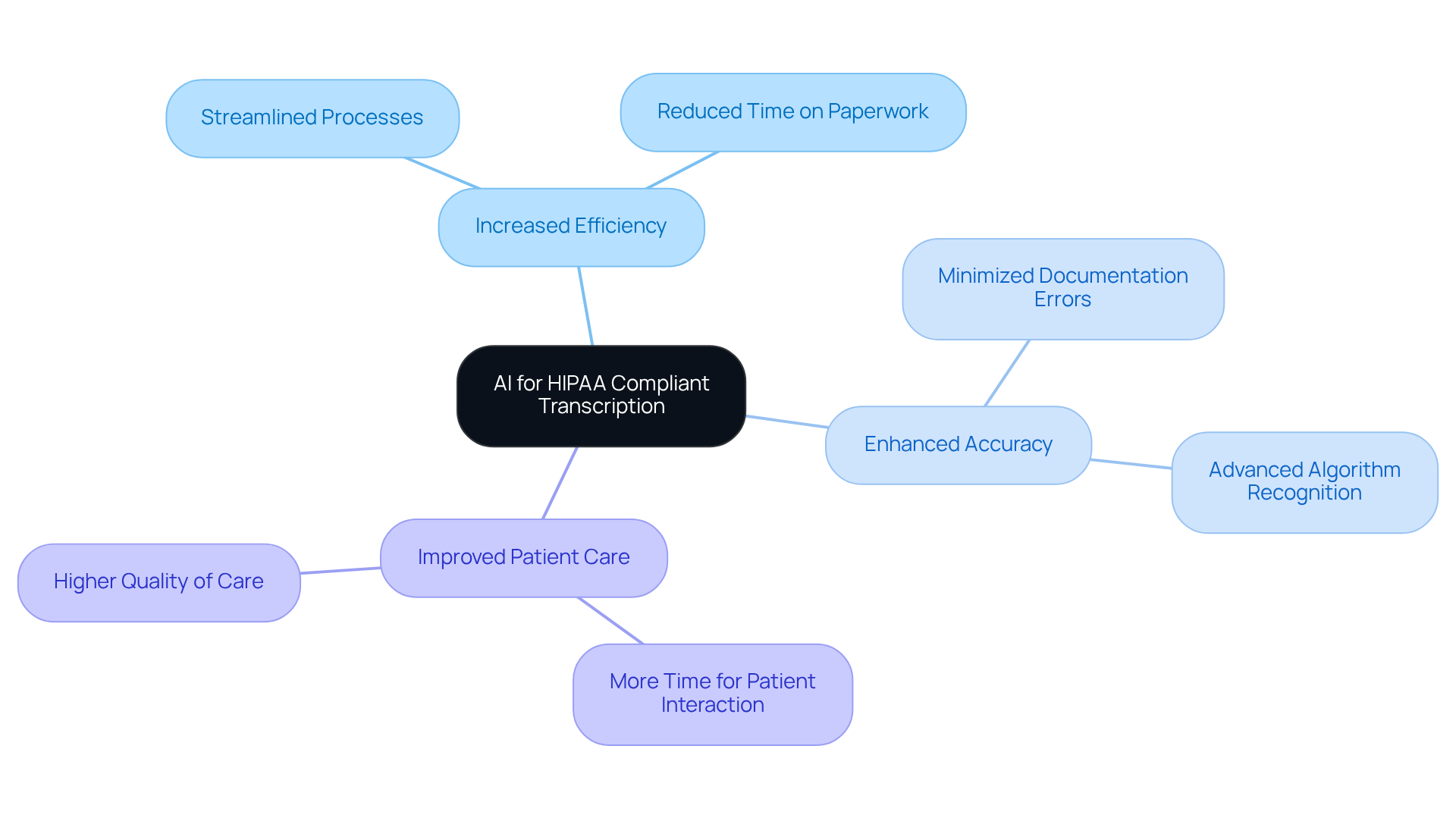
Holistic Impact: Transform Healthcare Delivery with HIPAA Compliant Transcription
In today's healthcare landscape, the emotional challenges faced by providers can be overwhelming. HIPAA compliant transcription services can significantly enhance individual privacy protection, improve communication, and optimize operations. These services not only ease administrative burdens but also create a more effective medical environment.
Imagine a practice where HIPAA compliant transcription is seamlessly integrated. Practitioners can look forward to a notable improvement in patient satisfaction and health outcomes. Research shows that effective documentation leads to clearer communication between providers and individuals, which is vital for fostering trust. When individuals feel acknowledged and understood, it transforms their experience.
As medical organizations increasingly prioritize individual privacy, ensuring HIPAA compliant transcription becomes a cornerstone of compassionate care. This commitment to confidentiality not only protects sensitive information but also positively shapes individuals' perceptions of their medical experiences.
Ultimately, the integration of compliant transcription services benefits healthcare providers by enhancing operational efficiency and enriching the overall patient experience. This leads to improved health outcomes and heightened satisfaction. Are you ready to embrace a change that prioritizes both care and efficiency? Your .
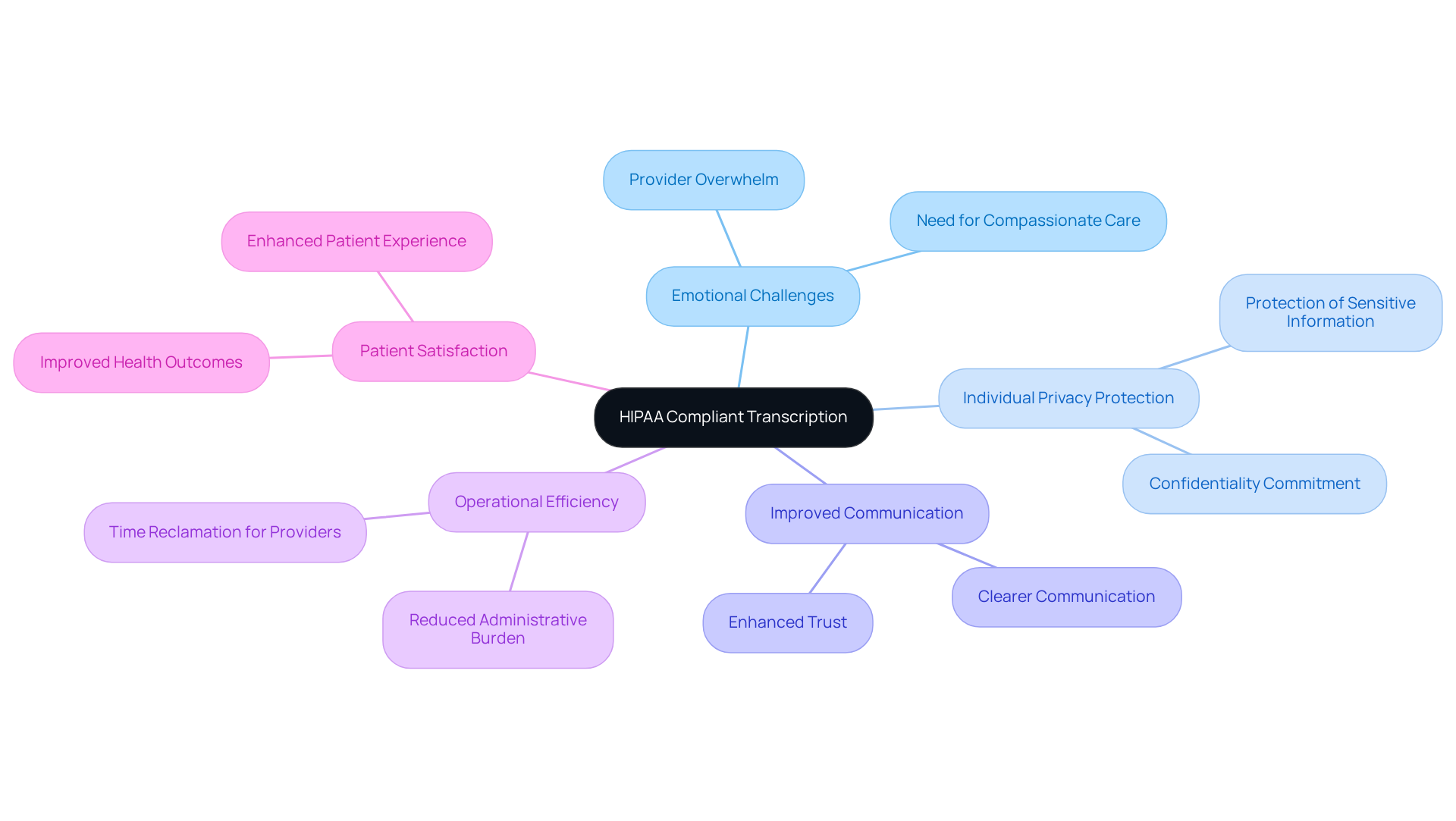
Conclusion
HIPAA compliant transcription services are vital in enhancing the healthcare landscape. They not only protect sensitive patient information but also improve operational efficiency. By embracing these services, healthcare providers can ease administrative burdens, build trust with their patients, and concentrate on delivering exceptional care.
Have you felt the weight of administrative tasks affecting your ability to provide quality care? Throughout this article, we’ve highlighted key benefits, such as:
- Reduced human error
- Improved communication
- Enhanced patient trust
The integration of AI technology streamlines documentation processes and ensures compliance with HIPAA regulations, ultimately leading to better patient outcomes. Furthermore, the emphasis on continuous training for transcriptionists underscores the commitment to maintaining high standards of care and safeguarding patient data.
As the healthcare field evolves, prioritizing HIPAA compliant transcription is essential for both patient safety and provider satisfaction. By adopting these innovative solutions, healthcare organizations can confidently navigate the complexities of documentation, ensuring that patients receive the quality care they deserve. Embrace this opportunity to transform your practice—investing in compliant transcription services is investing in a brighter, more secure future for healthcare.




